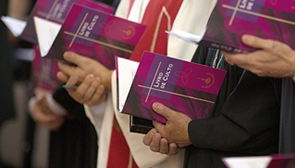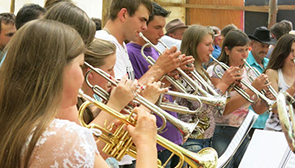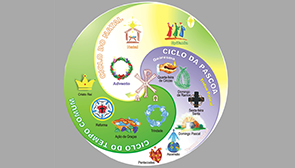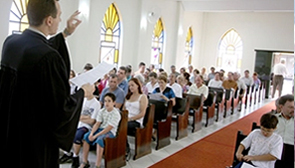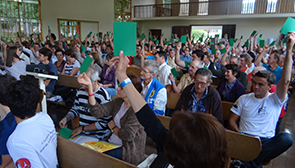1. Every day the number of religious groups increases within Brazil and the creeds become ever more diversified. Churches, particularly the historical ones, see themselves being cornered by a religious fervor that attracts their members and pulls them to other affiliations. Sects, new religious movements which are charismatic and spiritualistic, besides the traditional Christian denominations, wrestle for the people's faith. One could say that they are exploiting a market seeking out clients, transforming the Nation into a giant religious shopping center, with offers for every taste. Religious pluralism is exploding, corroding the relative confessional uniformity which the people had in the past and subverting the bond with one of the traditional churches.
The new religious movements are exploiting a market seeking out clients, transforming the Nation into a giant religious shopping center, with offers for every taste. Religious pluralism is exploding, corroding the relative confessional uniformity which the people had in the past and subverting the bond with one of the traditional churches.
2. We also feel this impact within the IECLB. The penetration of the sects and other religious groups causes growing concern in many congregations. The climate of competition in which we live can be cause for inciting conflicts that supposedly have been considered past history and reviving the proselyte spirit within the Christian denominations themselves, damaging the ecclesiastical fraternal spirit and the credibility of the witness. The IECLB, has in the past and in the present, suffered a cut in its membership, not in the least because of missionary aggressiveness by others who have sometimes operated with very disloyal methods. The stability and life of the congregation are not all that are at stake. Religious diversity also favors confessional relativism which could end in complete indifference. In terms of faith – what is valid? How can one distinguish faith, superstition, idolatry, perversion from devotion? It is understandable then, that the religious situation is reason for concern for the IECLB and raises the issue of an adequate reaction.
3. The issue is being worked on. We wish to call attention to the activities of the Instituto de Capacitação Teológica Especial/ ICTE (Lay Theological Training Institute) at the Escola Superior de Teologia/ EST (Lutheran School of Theology), and particularly the booklets published by this Institute under the title of Série Novos Movimentos Religiosos (New Religious Movements Series) . They offer very valuable information. In order to complement the reflections occurring within the congregations, the Church Council liberated Pastor Dr. Ingo Wulhorst to dedicate himself full-time to assisting the congregations through courses, seminars and the development of resources. Other initiatives could be mentioned. Regional Pastors in their pastoral functions have many times worked with the material based on the Theological Commission's and Pastor Ingo Wulfhorst's statements. They decided to direct themselves to the communities in a manifestation aimed at complementing and reinforcing the reflection that is already under way. Therefore we present now the thoughts that follow as a study document, a contribution to the debate and as pastoral orientation.
4. In first place it is important to reaffirm the necessity of an ample discussion of the religious issue. Faith needs to be lived out consciously. The times are past when the church could trust in the strength of its tradition. Community needs to be continually restructured. This is one of the good services provided by religious pluralism: it forces the church, including the IECLB, to constantly give account of its creed., demanding motivated members. We need to occupy ourselves with our faith, reaffirm it in truly assumed confession, live it consciously in our day to day life. This also has as it premise information about different faiths and the evaluation of other creeds. It is obvious that we cannot all be specialist in religious matters. Even so, the instruction in the faith needs to be as ample and intensive as possible, following in this way one of the basic principles of the Reformation of the XVI Century. Martin Luther's Catechisms had in mind the maturation of the congregation and each Christian as being responsible for their faith. The religious competition to which we are exposed demands an aware congregation, and therefore one that is capable of distinguishing the chaff from the wheat and of resisting the seductive bargains offered by the religious supermarket.
Times are past when the Church could trust in the strength of its tradition. Community needs to be continually restructured. The religious competition to which we are exposed demands an aware congregation and therefore one that is capable of distinguishing the chaff from the wheat and of resisting the seductive bargains offered by the religious supermarket
.
5. The accentuated religious pluralism of our days naturally has its causes. It is a characteristic of modernity and the individualism that is implied by it. The big institutions of the past are looked upon with suspicion. They are seen as restrictors of individual liberties. Besides this, the mobility within society, the ease of communication, the cultural exchange, bringing people closer to one another are other contributing factors. In Brazil, the religious effervescence is due to yet other factors. The cultures repressed in the past are resurging, such as the Afro-Brazilian culture. However, the misery, the uprootedness due to the migratory process, the break in traditional values are causes that merit note. The proliferation of beliefs is but a symptom of the profound human and social crises. It expresses a cry for help. In the critical situation of the Brazilian society any offer of salvation, whatever problems it may have, will find a clientele. The so-called religious migration or the frequent changing of religion is a result of this. It is common to find people who were Catholic, Spiritualists, Pentecostals, Lutherans in a desperate search of real help. Therefore in order to understand the religious phenomena in the Country, one needs to hear the cry inherent in it. It puts the question to the IECLB: To what point has the church, and is the church, lacking in the fulfillment of the people's just demands? The study of the causes of the religious pluralism is fundamental for an adequate reaction, which inevitably includes a critical evaluation of the discourse and the practice of the IECLB itself.
6. It is good to remember that the situation of competition is in no way foreign to the Christian faith. The Church was born in a period and environment marked by much tumult and an extraordinary variety of beliefs. In many places, the New Testament clearly mirrors this situation. Analogous situations have repeated themselves throughout the passing of ecclesiastical history. In truth, uniformity of the faith can only be assured by rigid institutional control and by relying on means of coercion. This, however, conflicts with the Gospel itself, which never violates people. Imposed faith is never authentic faith. For these reasons the Christian church is committed to the defense of the principle of religious freedom. Mission should repudiate the use of violence, of pressure, of threats and depend only on the force of the word. In this perspective, the religious pluralism of our days is in no way a reason for horror. It points to a freedom that other periods possibly would have envied. Resorting to the arm of the state to discipline the religious chaos, thank God, is no longer permitted for us. The challenge demands another answer. It demands what the apostle Paul calls a demonstration of the Spirit and the power, respectively demanding a response from the Gospel itself.
7. The IECLB is a church strongly involved in the quest for the unity of Christians. It sees itself as a member of the greater body of Jesus Christ, of the communion of saints, of the universal Church. For this reason it does not claim any monopoly of the truth, nor exclusiveness. It considers itself a sister to other Christian churches in seeking out the Kingdom of God and God's justice. It is committed to the Gospel proclaimed by the Holy Scriptures. It is also committed to the creeds of the Ancient Church and the confession of the Lutheran Reformation, in which it recognizes the legitimate expression of the Apostolic faith. The IECLB seeks to be authentically evangelical. It has a gift to share and values to defend. But it does not deny the action of the Holy Spirit in other churches and Christian denominations, being with them in the constant learning of discipleship. Ecumenism is the walking together of the people of God where the groups respect each other and mutually evaluate each other with the goal of growing in the knowledge of the marvels of God and in working out their witness and service. God also acts outside the walls of the ecclesiastical institution itself. God even acts in other religions and beliefs. It would be arrogant to want to limit divine action and prescribe horizons to it. Such a statement however does no permit relativism of the faith. There are truths that, coming from Jesus Christ, we cannot renounce and which are the basis of the Gospel and human salvation. Ecumenism means the willingness to be part of a true partnership without precipitately leveling out the differences that are peculiar to each of us. It is the courage to partake in a learning experience which, if it is sincere, will enrich us, overcome barriers and promote unity.
8. In communicating the faith, witnessing is fundamental. That is what Jesus called his disciples to do. He wanted them to be his witnesses to the ends of the earth. Religious truths are not summarized in abstract theories or private opinions, nor can they be compared with party platforms. The Christian faith tells a story that happened, speaks of the marvelous works of God, speaks of the experiences of the community with relation to the Gospel. Therefore, it needs to be announced. Witnessing the faith, if it is authentic, demands an ardent heart touched by the word of God, ready to even suffer harm because of it. It includes word and action, the message and the example, discourse and life experience. The type of faith that we embrace knows how to not be indifferent. For there is no more incisive way to determine a person's being than by the faith that they profess. With it, human behavior, the life style and the way of speaking, the values that are defended are at stake. Reducing religion to a purely private issue is not knowing its importance. Although faith should be taken on without coercion, it is vital to become aware of the fundamental role it plays in the life of the people and of society. In the same way it is not irrelevant to what church or religious group one belongs. Every ecclesiastical institution represents a certain concept of faith, a way of life and of worshipping God, a religious proposal. Up to what point it corresponds with the Gospel needs to be examined. But implicit in every affiliation with a congregation and Church is a confession. The Christian witness articulates the commitment with the Gospel testing all religious manifestations and measuring them with the criteria of God's mercy, which wants life for his creatures.
9. Alongside the witness and contained within it is dialog which is vital in the confrontation with other beliefs and other religions. We need to speak, debate, interpellate, seeking the example of Jesus himself. Dialog is not at all easy. One needs to learn how to do it, and it presupposes positions which need to be examined as to their solidness. Along with this, dialog is characterized by the fact that one takes the partner seriously. It wants to understand and convince, never impose. It is radically different from fanaticism and authoritarianism, which are violent attitudes. It is not only a method. Dialog expresses the fraternity that is to prevail among God's creatures. It takes seriously the fact that we are partners on the journey whose relationship demands respect and humility. Therefore any and all type of proselytism is excluded. The IECLB rejects it with good reason, as being incompatible with Gospel and the dignity of the people. Mission cannot consist of fishing faithful members from other denominations. In denying proselytism, however, the IECLB sees itself coerced into reacting when it is practiced by others. We have the right to self-defense as well as the duty to denounce anti-evangelical practices. Praising dialog, we also expect it from our partners.
10. Finally, service must be associated with dialog and witness. From the Christian point of view love is part of the orthodoxy of faith. There is no true mission without diaconia. This is what normally opens up spaces for proclaiming and for dialog, proving that they are authentic. As members of the IECLB we live together with other denominations and confessions. We coexist with persons who have needs, questions, anxieties. Our manner of coexisting is fundamental for the credibility of our discourse. One does not do mission only by way of mouth. It demands involved hands and feet, sensitivity to suffering, showing mercy. Jesus came to serve. He mingled with the needy people of his time and called upon his disciples to do the same. Religion can be abusive, perverted into business, serve to oppress. Love will oppose this and will proclaim the marvelous freedom of God's children, being that they do not permit that human need of any kind, be it material, spiritual, social or other, be ignored. In dialog and in the evangelical witness love customarily is the strongest argument. The pluralism of our days has in no way annulled this fundamental truth.
11. In the relationship with other Christian denominations and other religions therefore, witness, dialog and service must walk hand in hand. They do not allow themselves to be separated. They are complementary. One can not exist without the other, if we seek to faithfully carry out our mandate as the Evangelical Church of the Lutheran Confession in Brazil. Naturally, the emphasis can change from one to another aspect. In the same way it is obvious that there are confessions that are closer to ours and others more distant. We need to differentiate and not throw everything into the same category. Cooperation is easier with the Christian denominations and among these, with those churches that have been established in this country for a longer period. Jesus Christ is our common base. We join ourselves to the church of this our Lord as one more expression of the Christian faith seeking an intensification of our communion, even though there remain differences that need to be discussed. We build our unity upon the common imperative of continued learning of the permanent discipleship. But also in relation to other non-Christian religions, we place witness, dialog and service as principles of actions in the terms described above. We also can learn from this relationship, and in the same way, there remains the duty to communicate God's love which saves the world from hate, blindness and anguish or in other words from all the evils that keep humanity in captivity. Ecumenism begins with brothers and sisters in the Christian faith. But it does not permit that it remains limited to them. It wants to embrace others, more distant from our way of believing. This, in the awareness that all of humanity are called to be people of God on earth.
12. The IECLB must not refrain from divulging its faith. If it did that it would be burying the talent that it received, becoming, then, guilty before the Lord. What is important is that in the relationship with people of different beliefs, a sober attitude should prevail, equally distant from timidity, apathy or arrogance. There are mistakes and deficiencies among us that we lament and that need to be corrected. However, it is important to be aware of the fact that not every religion is good and not everything that is offered as truth is in fact true. It is up to us to distinguish the spirits as the Apostle Paul demanded from the community of Corinth. This means that we need to critically examine what is evangelical and what isn't. We cannot cease being a missionary church. However, since the beginning, authentic mission has always been ecumenical mission. It sought companions in the struggle. It was not a mission against the brothers and sisters but with them in the quest for the Kingdom of God. It seems to us that it is urgent to rediscuss mission with this perspective. This naturally, will not end the religious competition in the country. The religious phenomenon, as already related, is deeply ambiguous, it demands judicious examination, and Jesus' great commission continues to be the church's mandate, committing us to divulge the Gospel and construct communities. However, Christian mission carried out in the ecumenical spirit – with witness, dialog and service – will allay the competition and substitute it with a fraternal spirit, that within the differences, will practice mutual respect and have a joint commitment to the truth and to life. This is the relationship that the IECLB desires.
The proliferation of beliefs is a symptom of the human and social crisis. It expresses a cry for help. At the same time it puts the question to the IECLB: To what point has the church, and is the church, lacking in the fulfillment of the people's just demands? An evaluation of its discourse is necessary. In the confrontation with other beliefs, the IECLB needs to work harder at witnessing, dialoguing and serving.
Tradução: P. Dr. Wulfhorst



